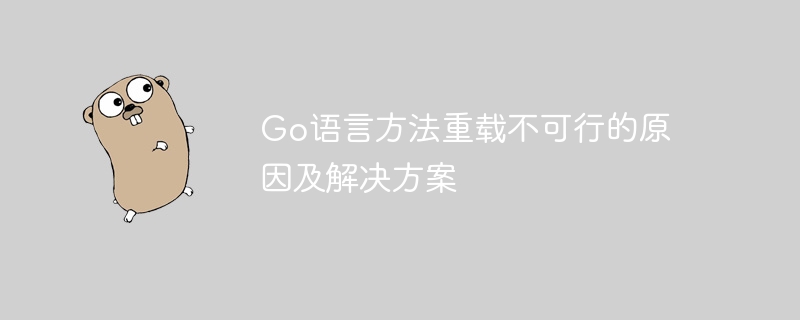
The Go language does not support method overloading due to static type checking complexity, loss of clarity, and incompatibility with interfaces. Alternatives include function overloading, interface methods, and polymorphism. Specifically, function overloading allows the creation of functions of the same name with different parameter lists, interface methods use interfaces to define methods and implement them in different types, and polymorphism uses type conversions and assertions to implement object methods with different types of parameters. transfer.

Limitations of method overloading in Go language
What is method overloading?
Method overloading is the ability to create methods in the same class with the same name but different parameter lists. It allows programmers to write more flexible and easier-to-understand code.
Limitations of method overloading in Go language
Unfortunately, Go language does not support method overloading. Only methods with the same name but different receiver types can coexist.
Reason:
Go language designers chose not to support method overloading for the following reasons:
Alternatives:
Although the Go language does not support method overloading, there are several alternatives to achieve similar functionality:
Practical case:
Consider a program that needs to calculate the area of various shapes. Using method overloading, we can define an overloadedArea()method in theShapeinterface, which receives different parameters according to different shape types:
type Shape interface { Area() float64 } type Square struct { Side float64 } func (s Square) Area() float64 { return s.Side * s.Side } type Circle struct { Radius float64 } func (c Circle) Area() float64 { return math.Pi * c.Radius * c.Radius }
However, in Go language we have to use alternatives:
package main import "fmt" import "math" func main() { square := Square{Side: 5} fmt.Println("Area of the square:", squareArea(square)) circle := Circle{Radius: 10} fmt.Println("Area of the circle:", circleArea(circle)) } type Square struct { Side float64 } func squareArea(s Square) float64 { return s.Side * s.Side } type Circle struct { Radius float64 } func circleArea(c Circle) float64 { return math.Pi * c.Radius * c.Radius }
package main import "fmt" import "math" func main() { var shapes []Shape shapes = append(shapes, Square{Side: 5}) shapes = append(shapes, Circle{Radius: 10}) for _, shape := range shapes { fmt.Printf("Area of %T: %.2f\n", shape, shape.Area()) } } type Shape interface { Area() float64 } type Square struct { Side float64 } func (s Square) Area() float64 { return s.Side * s.Side } type Circle struct { Radius float64 } func (c Circle) Area() float64 { return math.Pi * c.Radius * c.Radius }
The above is the detailed content of Reasons and solutions why method overloading in Go language is not feasible. For more information, please follow other related articles on the PHP Chinese website!
 Usage of Type keyword in Go
Usage of Type keyword in Go How to implement linked list in go
How to implement linked list in go What are the Go language programming software?
What are the Go language programming software? How to learn go language from 0 basics
How to learn go language from 0 basics What are the methods to implement operator overloading in Go language?
What are the methods to implement operator overloading in Go language? What are the operators in Go language?
What are the operators in Go language? y460 graphics card switching
y460 graphics card switching What are the Oracle index types?
What are the Oracle index types?



